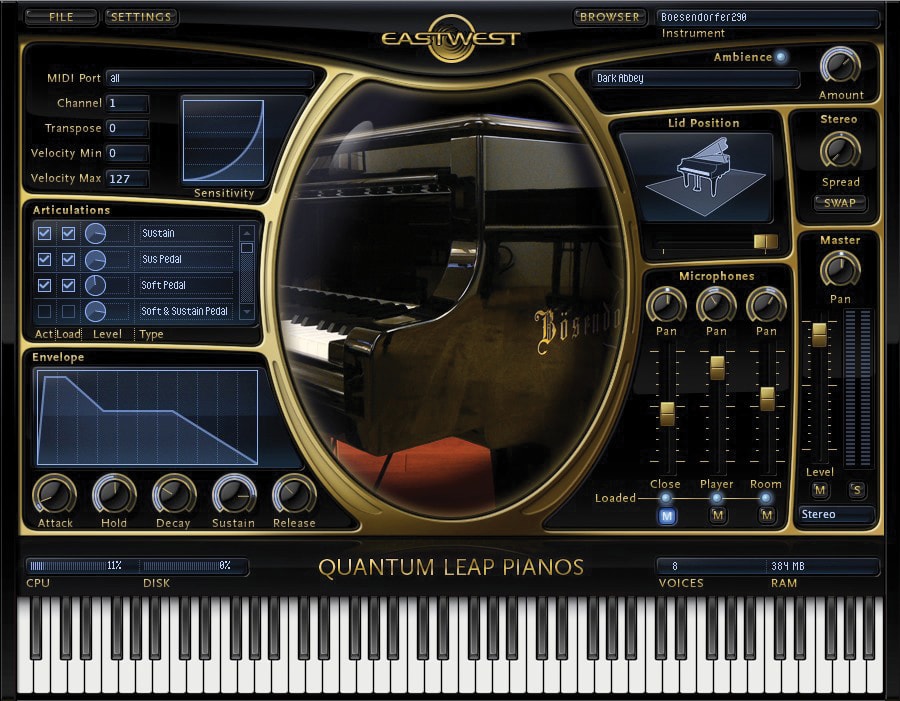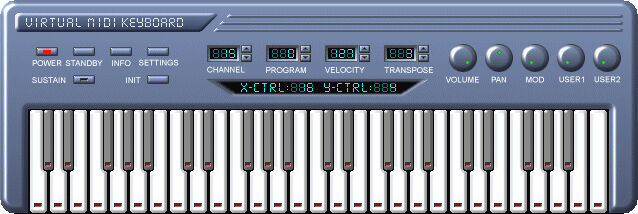
- VIRTUAL MIDI PIANO KEYBOARD PLUGIN SKIN
- VIRTUAL MIDI PIANO KEYBOARD PLUGIN UPGRADE
- VIRTUAL MIDI PIANO KEYBOARD PLUGIN FULL
- VIRTUAL MIDI PIANO KEYBOARD PLUGIN DOWNLOAD
VIRTUAL MIDI PIANO KEYBOARD PLUGIN FULL
Finally you can use the VirtualKeyboard Standalone version to open, play, pause and resume MIDI files at different speeds without loading a full featured DAW.
VIRTUAL MIDI PIANO KEYBOARD PLUGIN DOWNLOAD
This download includes 2 VST/AU plugins: VirtualKeyboard and VirtualKeyboard Synth, and a 'normal' standalone program: VirtualKeyboard Standalone. VirtualKeyboard doesn't produce sound (it is only a MIDI plugin). VirtualKeyboard Synth or VirtualKeyboard Standalone have a SFZ (AKA Sound Font) Sampler built-in where you can select a piano or other sounds.Cubase (option A): Click on "Devices" > "VST Instruments" on the top application menu (or F11).Add VirtualKeyboard and your Synthesizer of choice as "Rack Instruments" (right-click on the background to have this option). Create a MIDI track, select "All MIDI inputs" in the input and select your Synthesizer of choice in the output.

Then go to the "MIDI Sends" tab, click on the second line of the first slot and select "VirtualKeyboard Midi In". Cubase (option B): Create instrument track, select "VirtualKeyboard" as Instrument on one track and select "All MIDI inputs" as MIDI input.
VIRTUAL MIDI PIANO KEYBOARD PLUGIN UPGRADE
The era of digital and web 2.0 does not contrast the success and longevity of this "noble" instrument: today the electronic piano offers the same sounds as an upright or grand piano, but it is mobile, light, compact and removable.Logic Pro 9: Logic Pro 9 unfortunately doesn't support "MIDI FX" (you would have to upgrade to Logic Pro X).Now create another instrument track, select your synthesizer of choice as Instrument, select as MIDI Input "01 VirtualKeyboard - MIDI Out" and click on the little speaker below the track's name to monitor it.
VIRTUAL MIDI PIANO KEYBOARD PLUGIN SKIN
It is only around 1880-1890 that the piano as we know it today will take its shape.Īt the dawn of the twentieth century, the skin that wrapped the heads of the hammers was replaced by sheep's wool, which thus embellished the sound of the piano keys. The brand helps to give the piano its status as a prestigious instrument and to become part of the history of this instrument. Pianos become more aesthetic, more robust, more powerful. The first major industrial manufacturer of pianos is German and is called Blüthner. Little by little, the process evolves and an Alsatian family of German origin improved the instrument by modifying its hammer: the Silbermann family. Cristofori (1655-1731) develops the idea that the keys on which to press would operate hammers capable of striking the strings. The piano emerges from the evolution of the clavichord and harpsichord, beaten string instruments. Previously reserved for the elite and the upper class, this tool democratized in the second half of the 20th century. Born in Italy, remodeled several times in Germany, implemented industrially in the United States and now present in musical styles around the world, the piano is rich in history and features. His is a really interesting story, from an instrument for the few to an ambitious product in the modern world: we have to go back to the dawn of the 18th century to see the birth of the ancestor of the pianos as we know it today. The piano, a wonderful and fascinating string instrument, is the protagonist of countless compositions that have marked the history of music. Select local MIDI file by DnD or file selector to play. light-weighted 1 osc or FM based 2 or more osc.

Virtual Piano is a small synthesizer / MIDI player library written for your Browser with GM like timbre map.Īll timbres are generated by the combinations of Oscillator and Dynamically generated BufferSource algolithmically without any PCM samples.


 0 kommentar(er)
0 kommentar(er)
